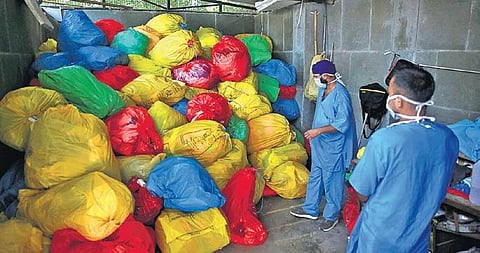

Right now, health and safety have taken priority over the environment. The way we are consuming Personal Protection Equipment (PPE kits) like surgical masks, gloves and shoe covers – will have a negative impact. And not being responsive to something like this even after four months is a little alarming,” says Environmentalist Vimlendu Jha.
PPEs are vital in battling the COVID-19 crisis, but need to be disposed daily, especially by healthcare workers. This waste is slowly piling up an environmental crisis. Delhi is still lagging in the systematic collection and disposal of this waste, which further poses a risk to the health of sanitation workers. Delhibased waste management expert Swati Singh Sambyal points to the CPCB report that indicates only 70 per cent of this waste is going to the incinerators.
“There is a still a gap of 30 per cent. Masks, gloves and PPEs have been found dumped outside the hospitals or even on the roads. There is no segregation happening at the household level. Waste collectors have to sort it, and in doing so are directly exposed to the potentially infected material. And the collectors reside in congested and densely populated places. In case they are asymptomatic or infected, they will pass the virus onto others.”
Many still dump their household garbage in one polybag and throw it at the nearest dhalao, observes Chitra Mukherjee, Head for Advocacy and Policy at Chintan, a non-profit organisation that works with the NDMC. “We have been partnering with a registered inform a l wastepickers’ association called Safai Sena, and have trained these ragpickers that during their doorstep garbage collection tell people about disposing PPE waste in a separate bag.” Radha Krishan, PRO, SDMC, informs that the collected garbage is then taken to the landfill site in Ghazipur.
“It is segregated there and the masks, PPE kits and gloves that are found are sent to the waste-to-energy plant in Tehkhand.” Sourabh Manuja, Fellow, Environment and Waste Management Division, TERI, brings to attention that “masks, gloves and kits should be disposed separately in yellow bags for at least 72 hours, before being thrown out. But this doesn’t happen.” That’s why plastic has always been an unsolved issue.Jai Dhar Gupta, Founder of Nirvana Being, says that barring gloves and goggles, every type of PPE is made up of some form of plastic. “And the amount of plastic that is going into our air, water and food (in the form of micro plastic) is ginormous. I think this is going to do more harm than COVID itself.”
Biomedical waste
“When it comes to COVID-19 waste from hospitals and quarantines, it has to be kept in colour-coded double-layered bags and then disposed,” adds Sambyal. A source at Safdarjung Hospital says that gloves made from polyvinyl chl oride, glass and needles can’t be incinerated, but the masks, PPE kits are packed in yellow bags for incineration. “The hospital has its own incinerator, but COVID waste management varies from hospital to hospital. Since ACs are not operational, we have to change at least three PPE kits a day,” he adds. “With the number of cases increasing, more waste will be generated and treatment plants may fall short of capacity,” adds Manuja.
The way forward
“Six months ago, we were talking of plastic-less India. Now, that has gone out of the window. The government needs to think this parallely with the COVID crisis as it will cause a long-lasting ecological hazard,” adds Jha. Cloth masks and cotton gloves can be used as they keep perspiration in check, but, “N95 is not meant for COVID protection. WHO asked healthcare workers to wear N95, which has efficacy of trapping particles 300 nanometers or larger. The average size of COVID particle is 120 nanometers. We need antiviral masks to ensure complete safety,” concludes Gupta
ALSO WATCH: